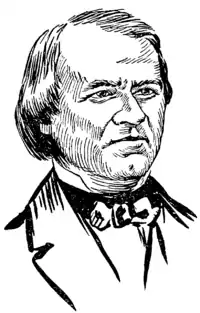JOHNSON, ANDREW, an American statesman, 17th president of the United States; born in Raleigh, N. C., Dec. 29, 1808. At 10 years of age he was indentured to a tailor, for whom he worked for seven years, receiving no schooling, but was taught to read by a fellow-apprentice. In 1826, with his mother, he emigrated to Tennessee. Here he married Eliza McCardle, a woman of good education, who instructed him in writing and other accomplishments. He was three times elected alderman, and then mayor in 1828–1830. In 1835 and in 1839 he was sent to the Tennessee Legislature. In 1840 he made campaign speeches for Van Buren, that gave him a wide reputation for oratory. In 1843 he was elected to Congress, and re-elected in 1845, 1847, 1849, and 1851. In 1853 Tennessee was “gerrymandered” to prevent his election, whereupon he ran for governor, and was elected. In 1857 he was sent to the United States Senate, where he ably advocated and secured the passage of a homestead bill, which President Buchanan vetoed. He ardently advocated the Union cause, and was made military governor of Tennessee by Lincoln in 1862, where he gave vigorous support to the Federal government. In 1864 was elected Vice-President, with Lincoln, and on the assassination of Lincoln, in April, 1865, became President by succession. His administration was marked by constant dissension between himself and Congress, and he was impeached before that body, for resisting the execution of the acts of Congress, and various alleged “high crimes and misdemeanors.” The trial was presided over by Chief Justice Salmon P. Chase. A two-thirds vote necessary to convict could not be secured, and the trial failed (May 16, 1868). A change of one vote, however, would have carried conviction. When his term expired he retired to Tennessee, and in 1875 was elected to the United States Senate, but died July 31, of that year.

ANDREW JOHNSON
Source: “Johnson, Andrew”, Collier's New Encyclopedia, V (New York: P.F. Collier & Son Company, 1921), pp. 268–269.